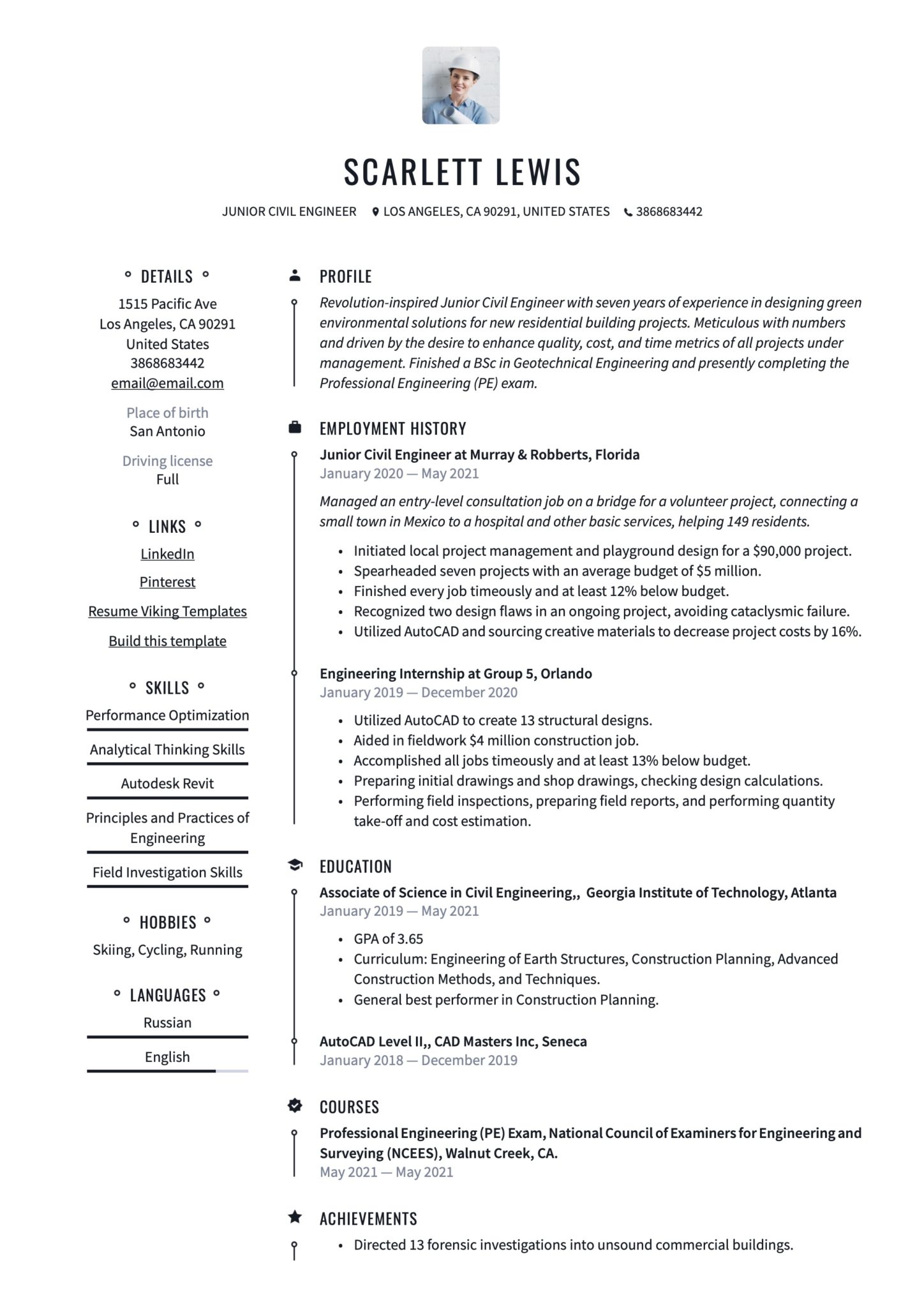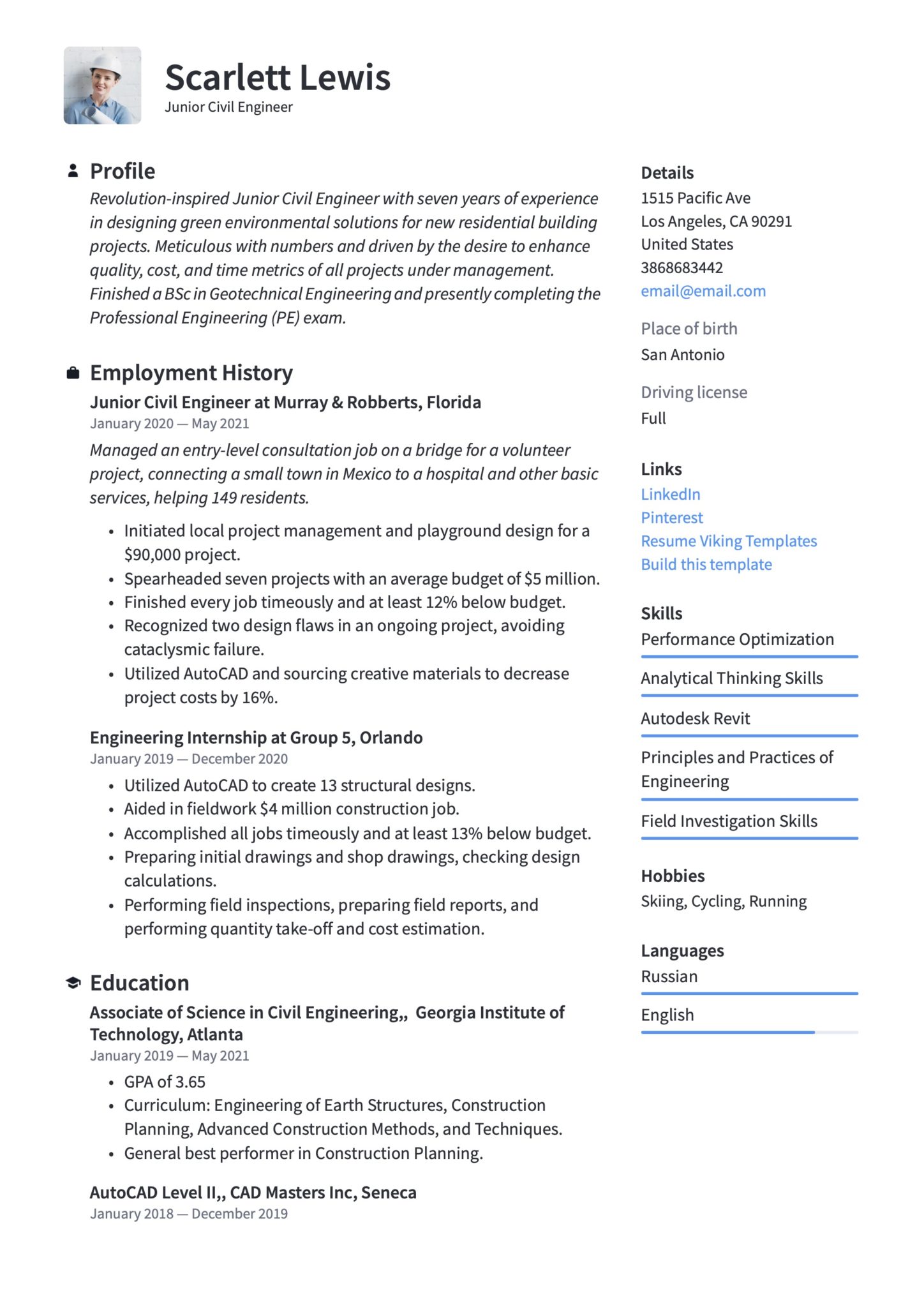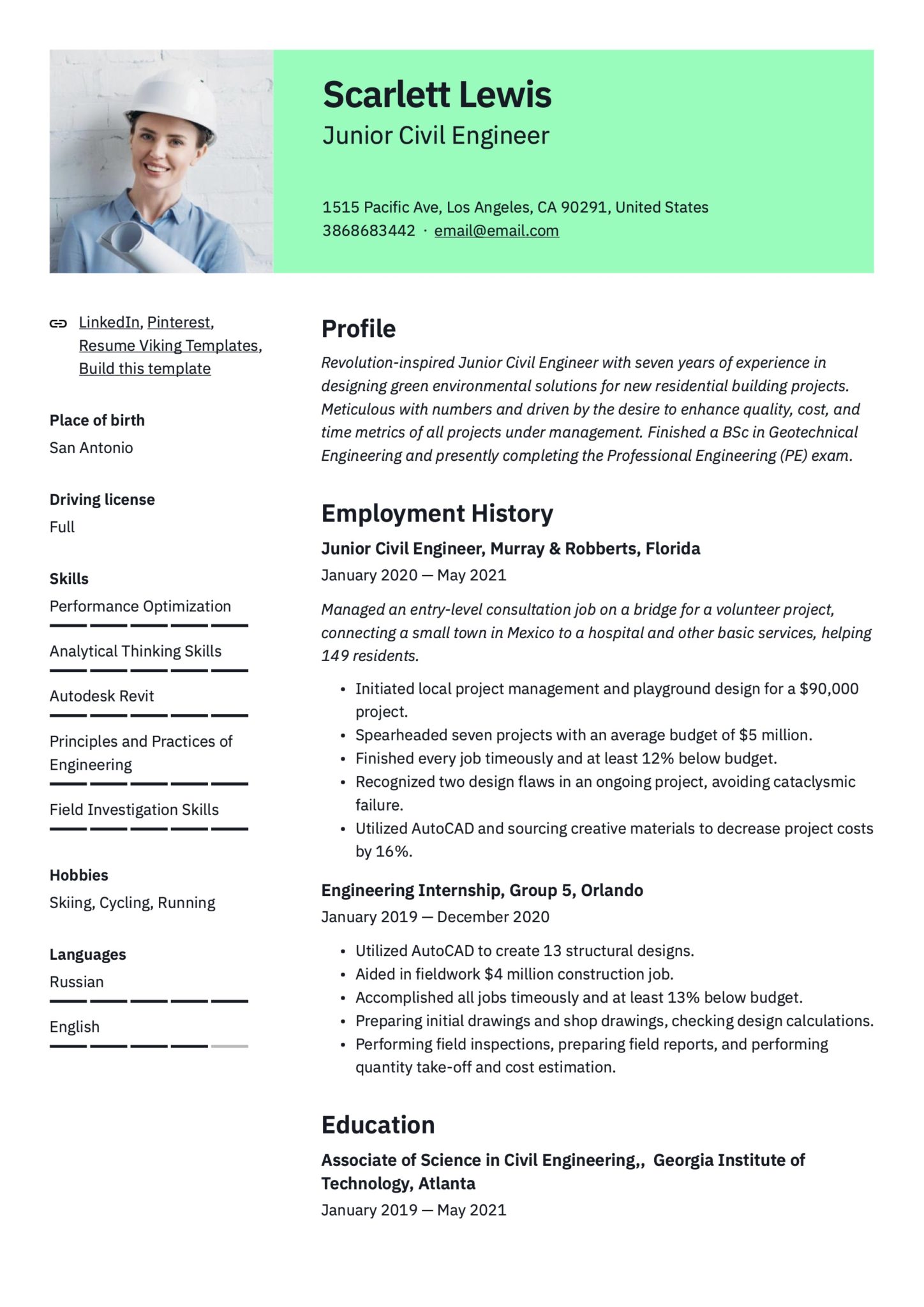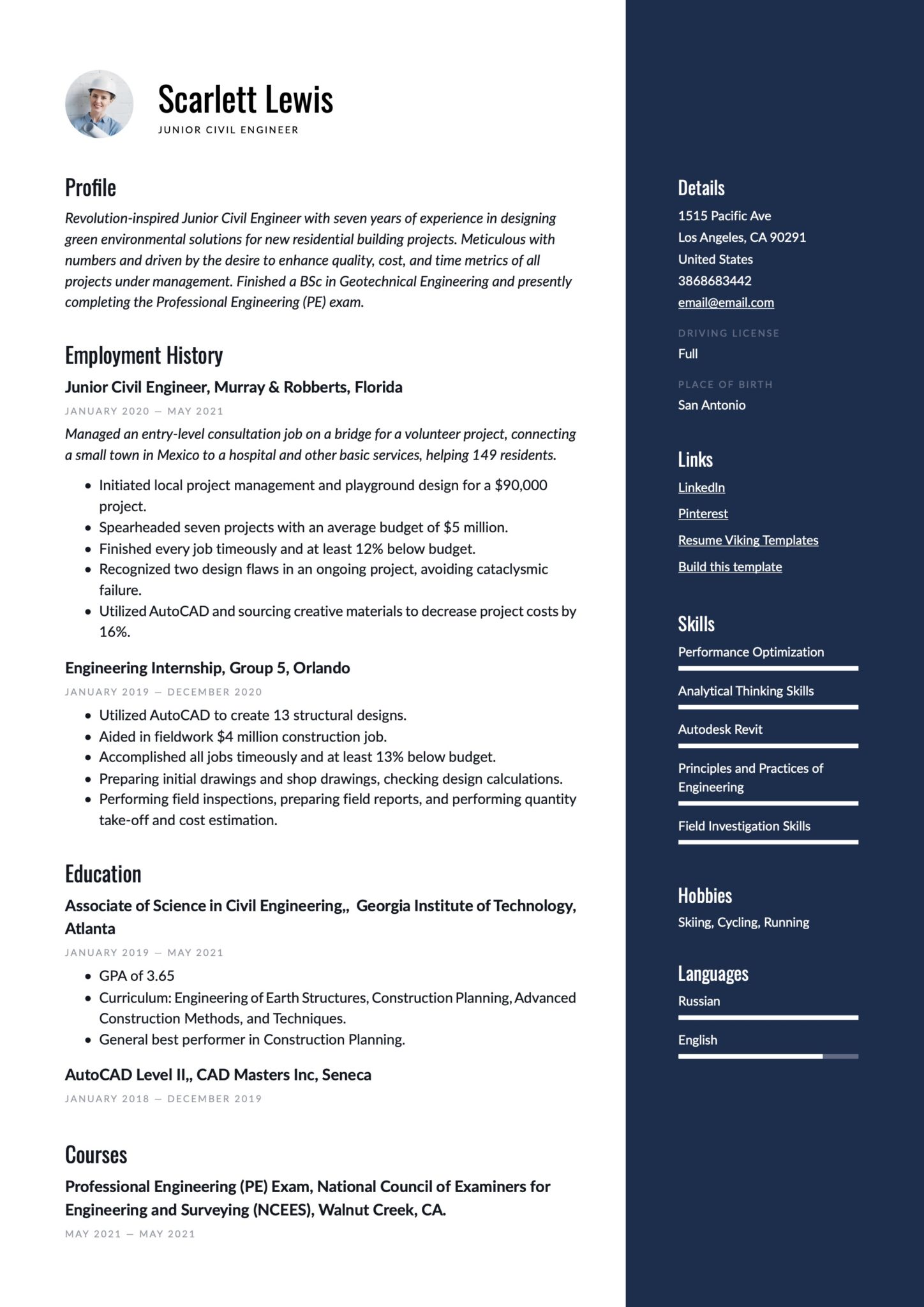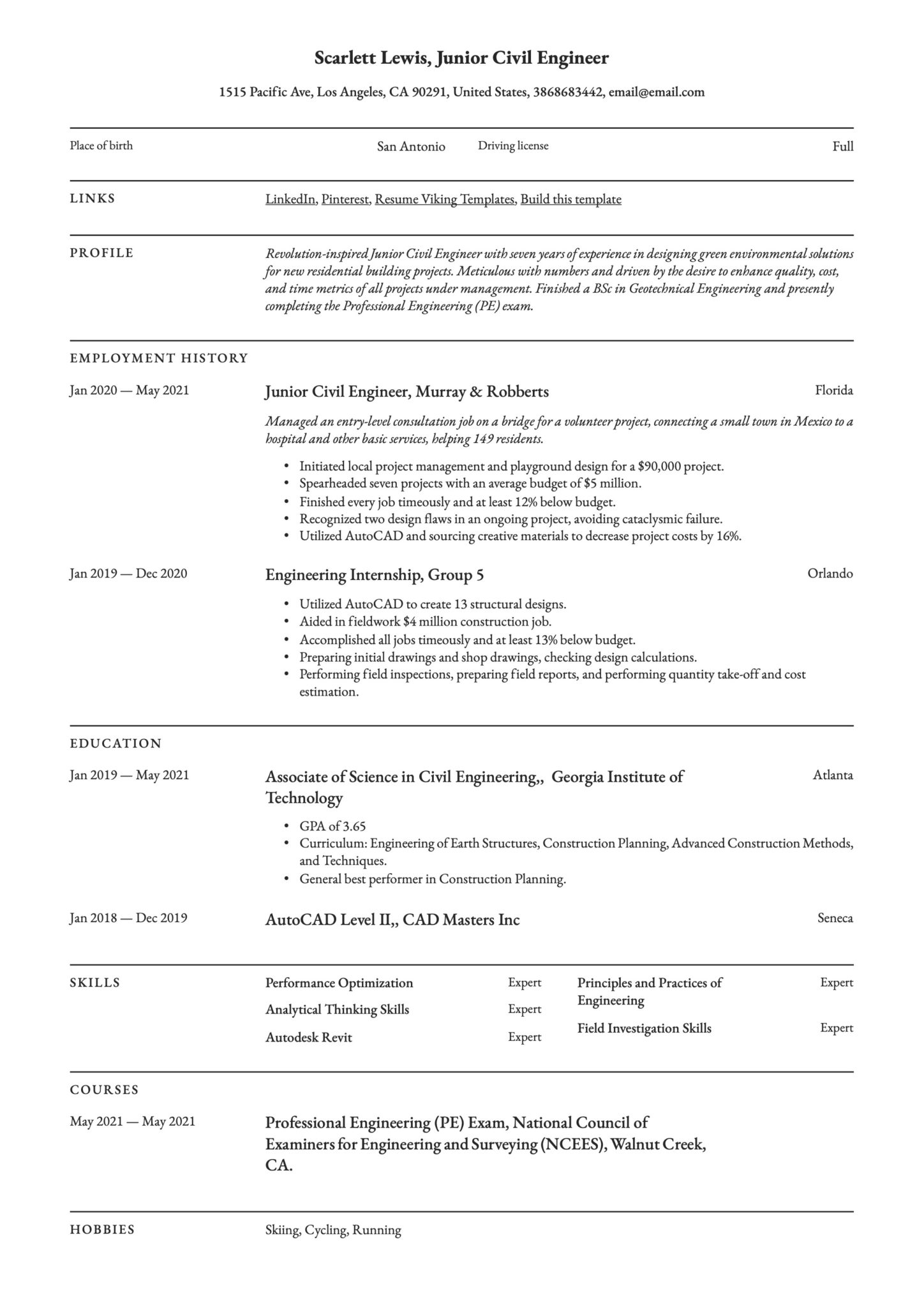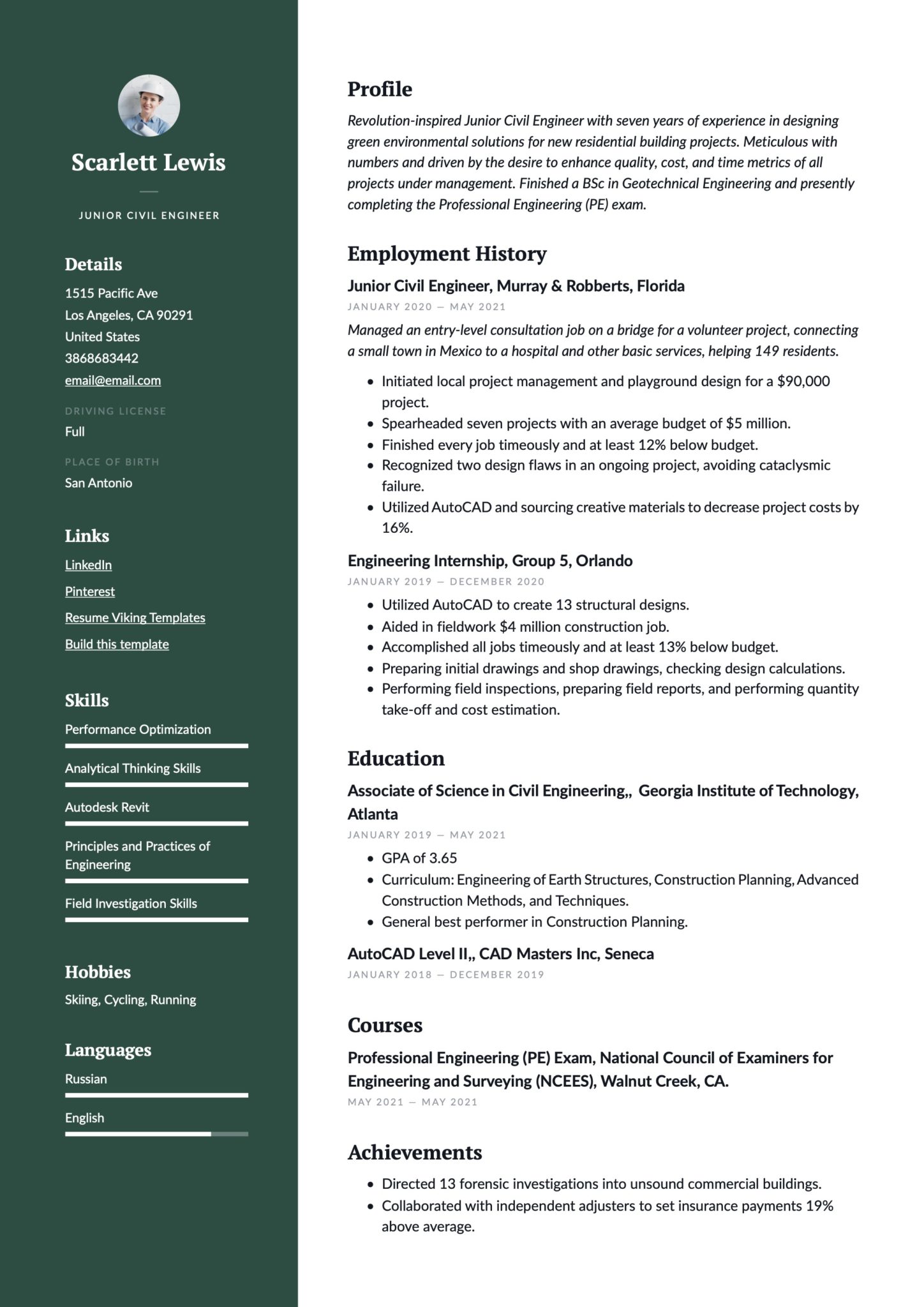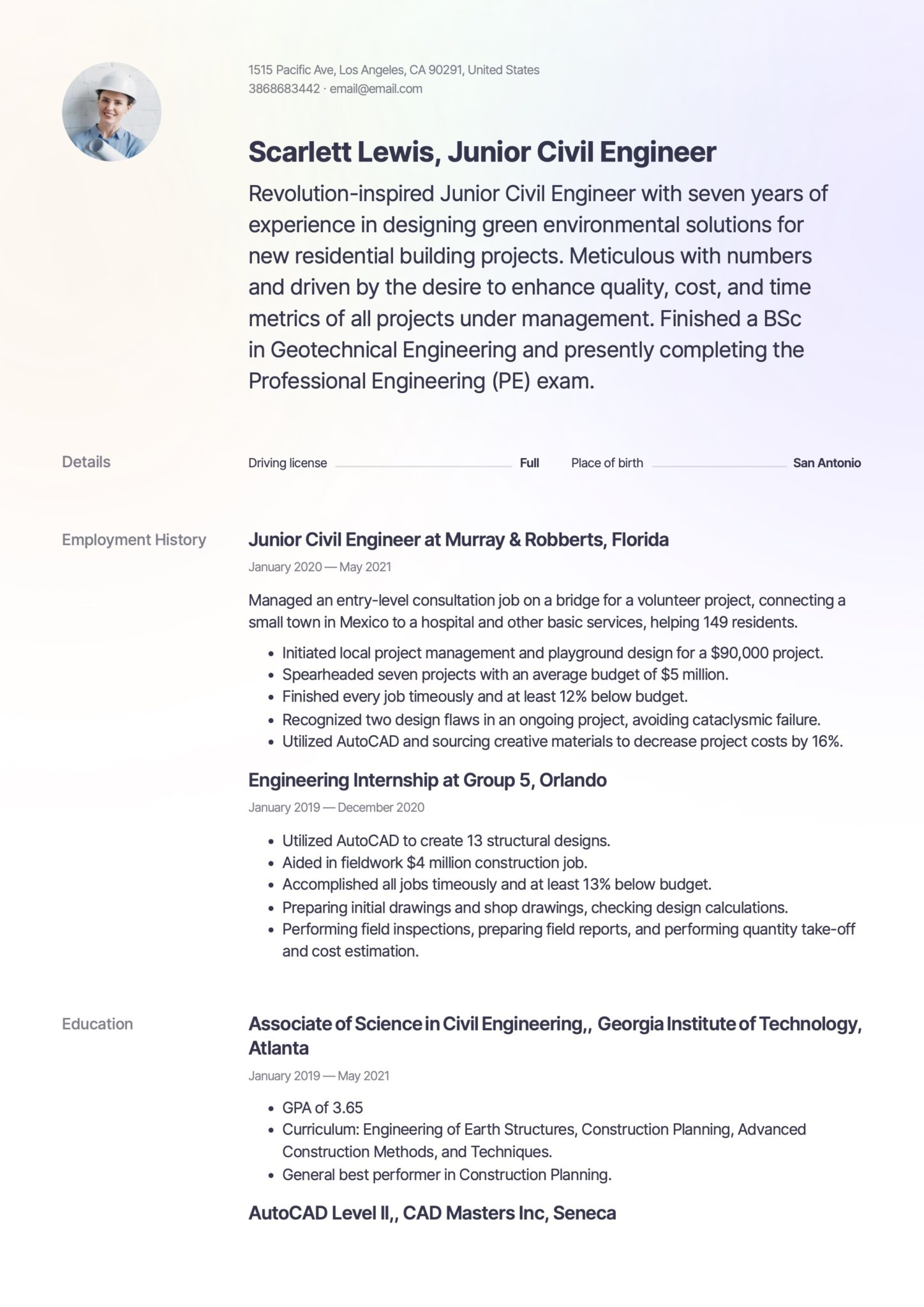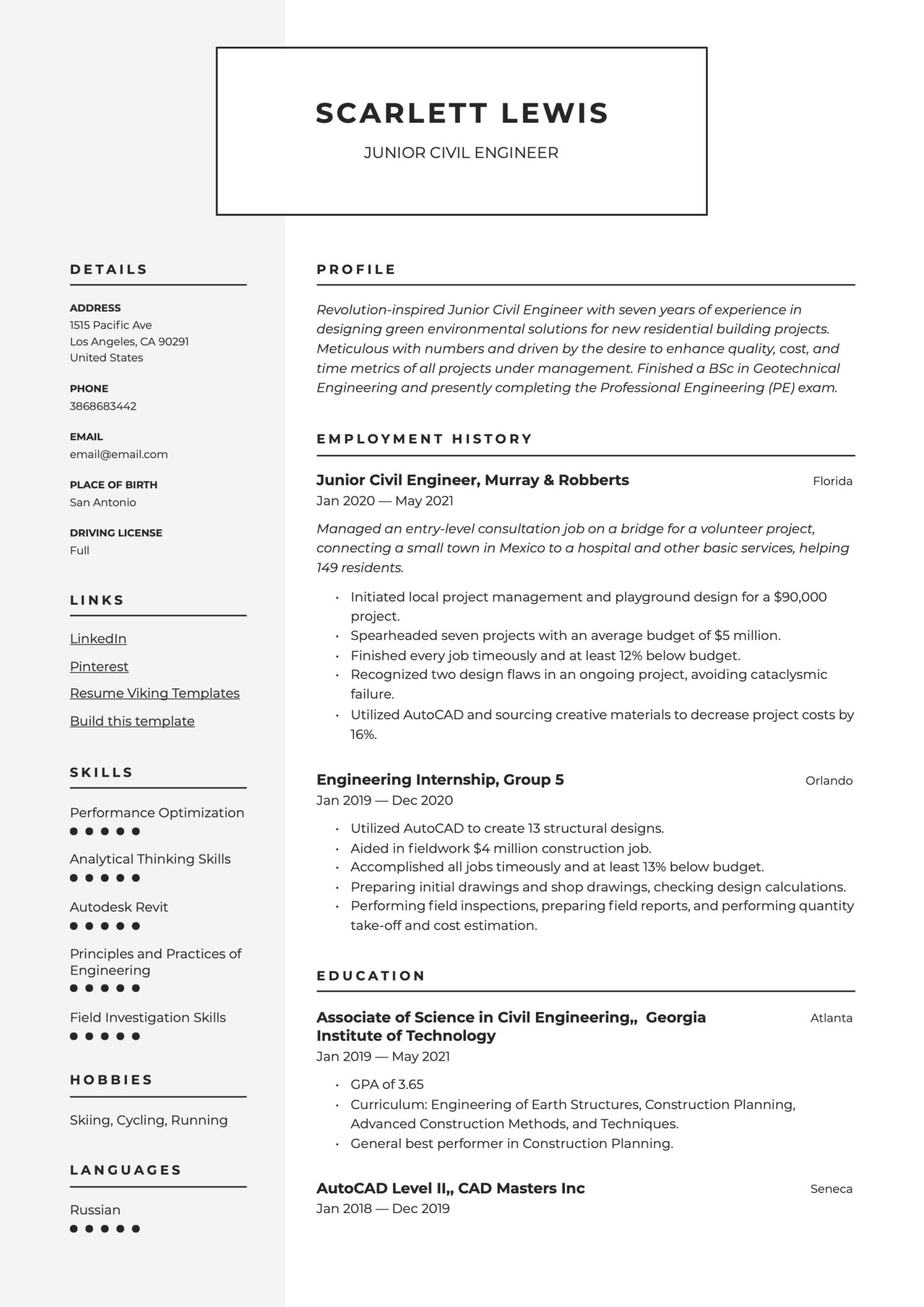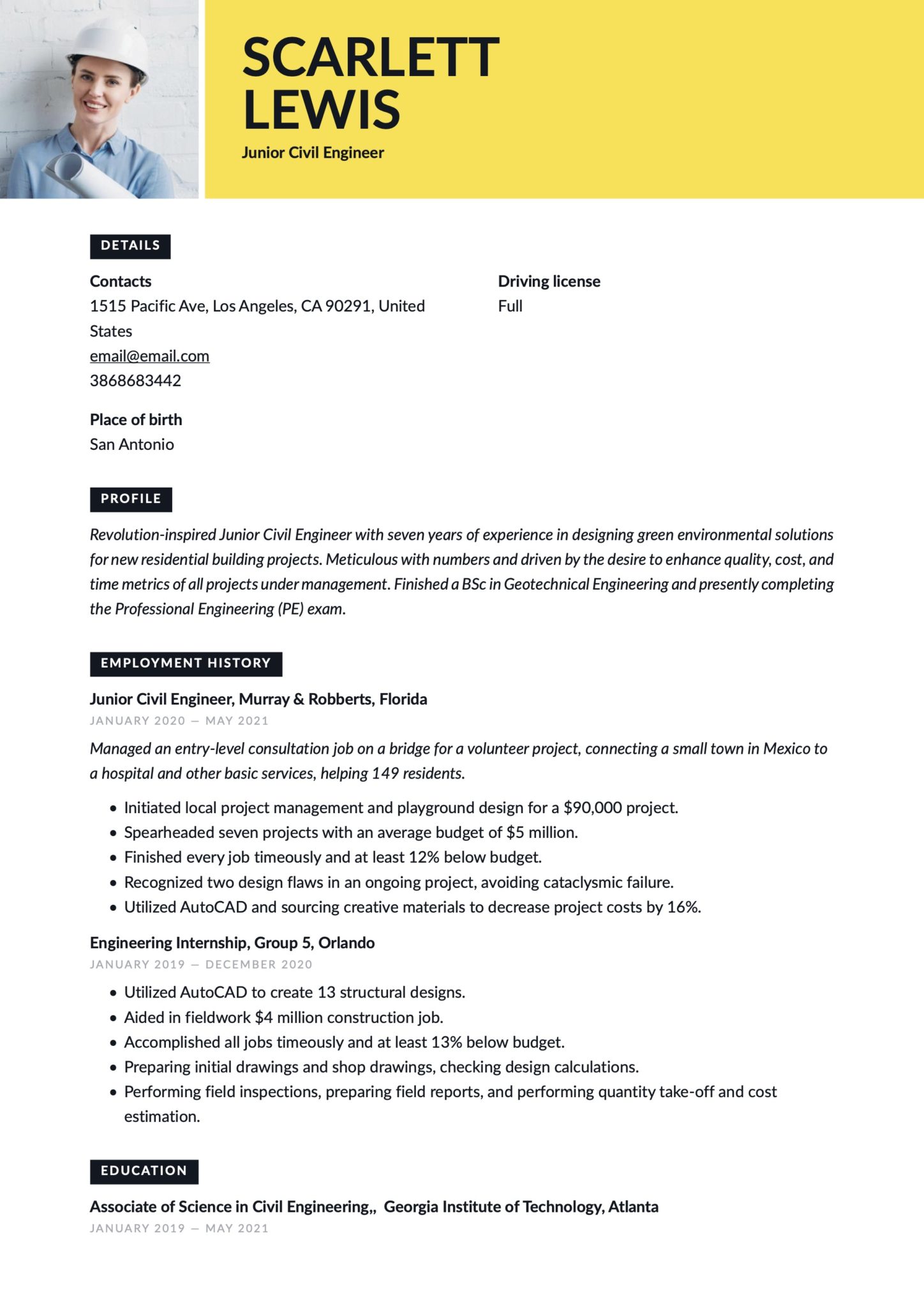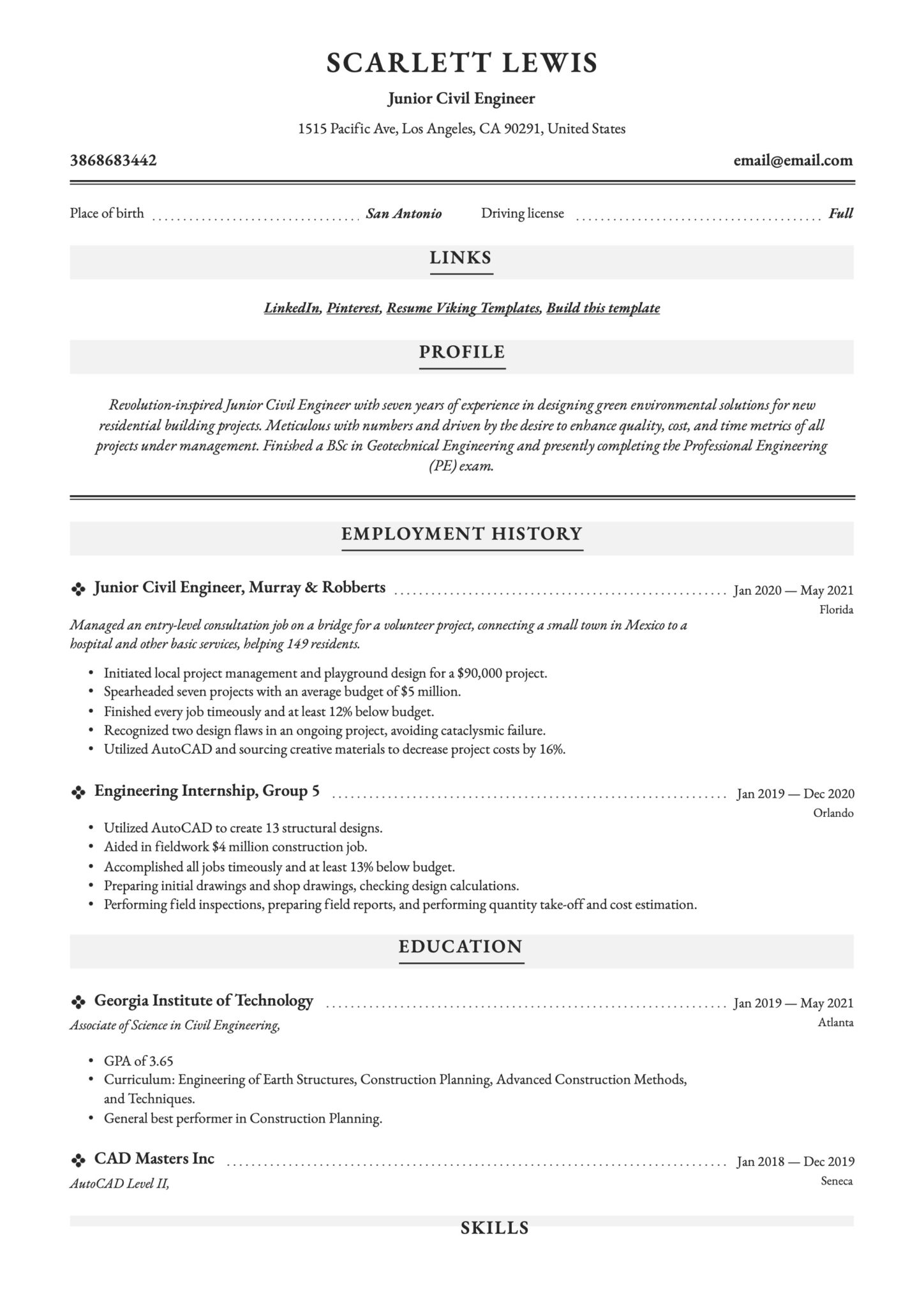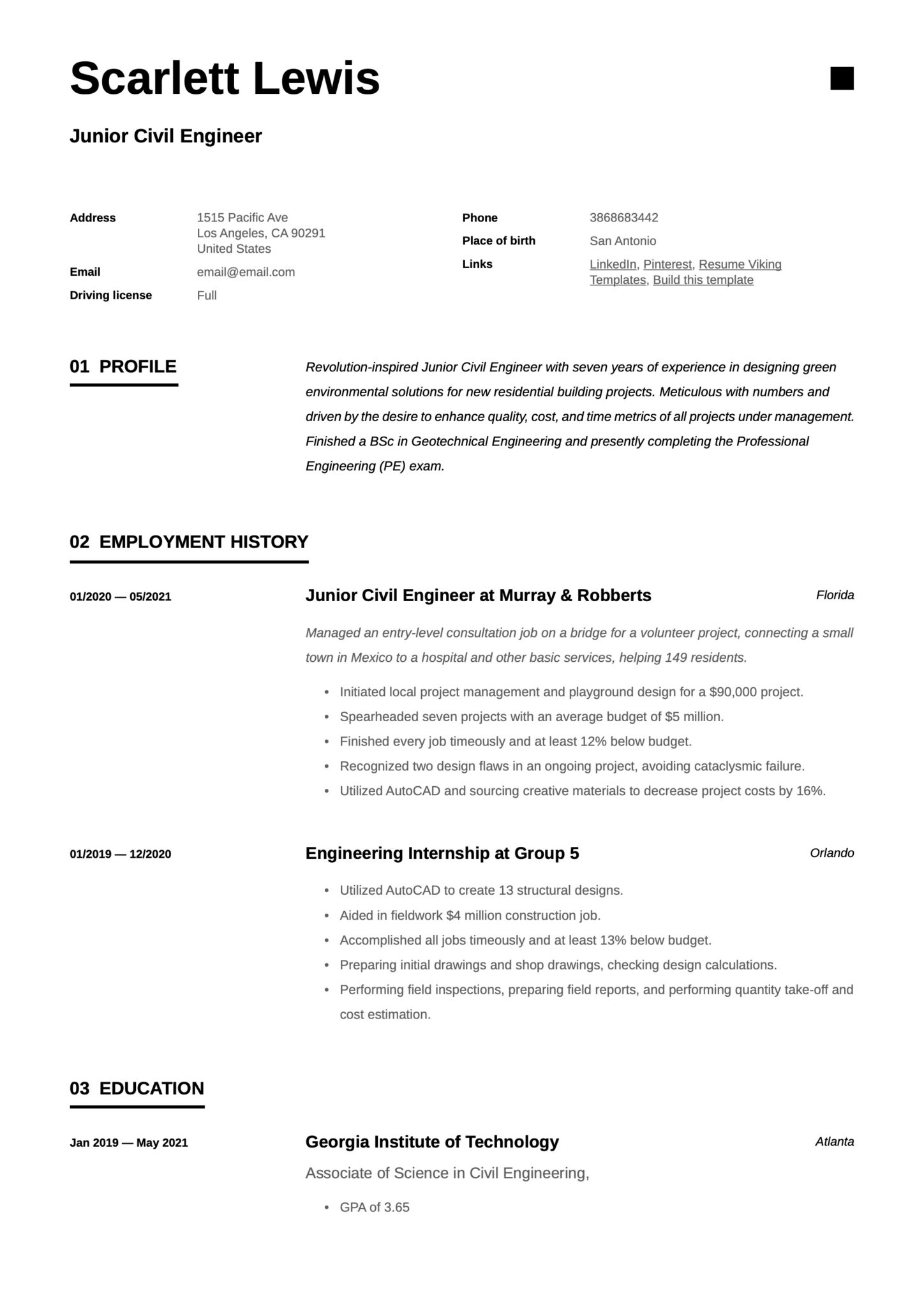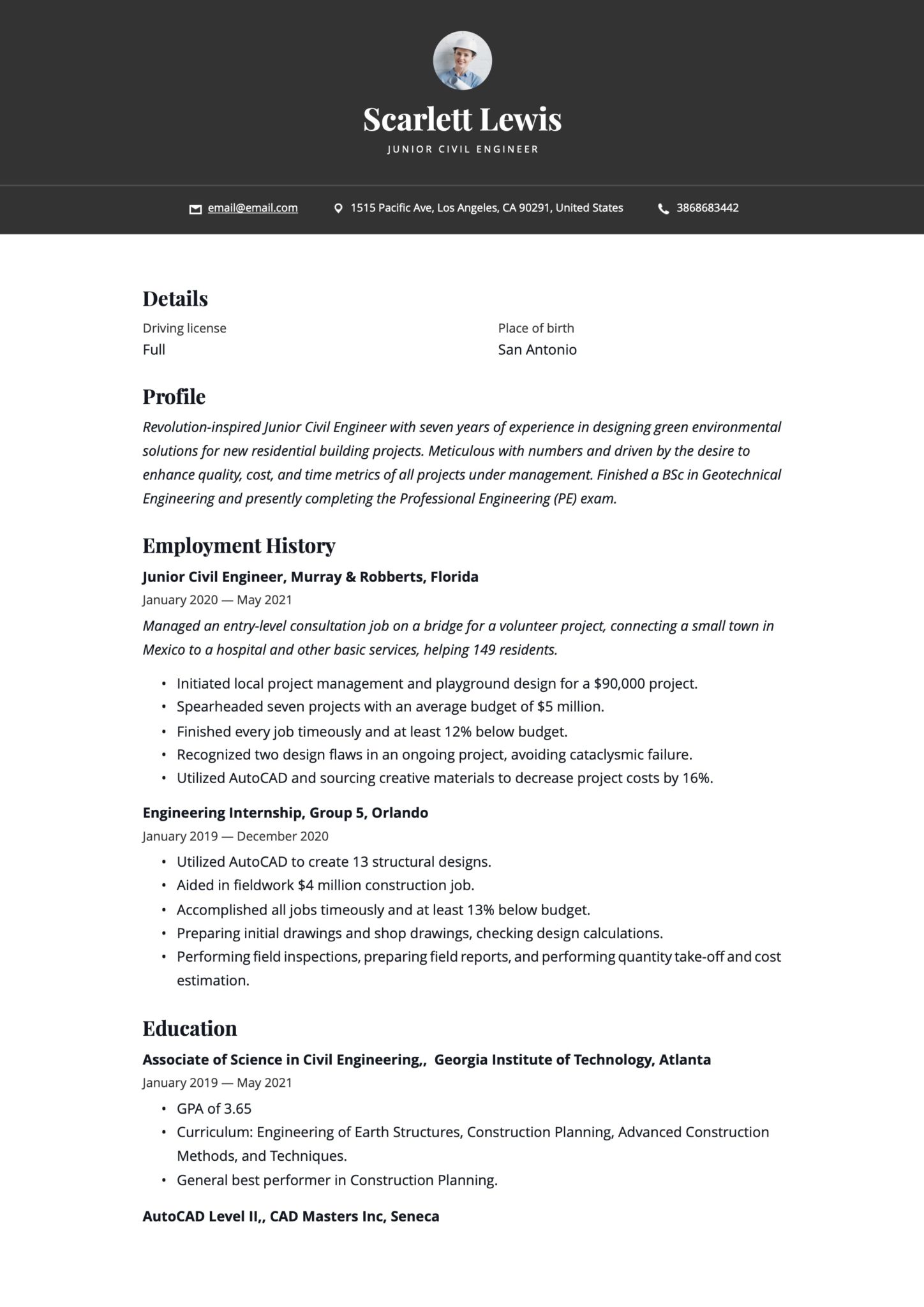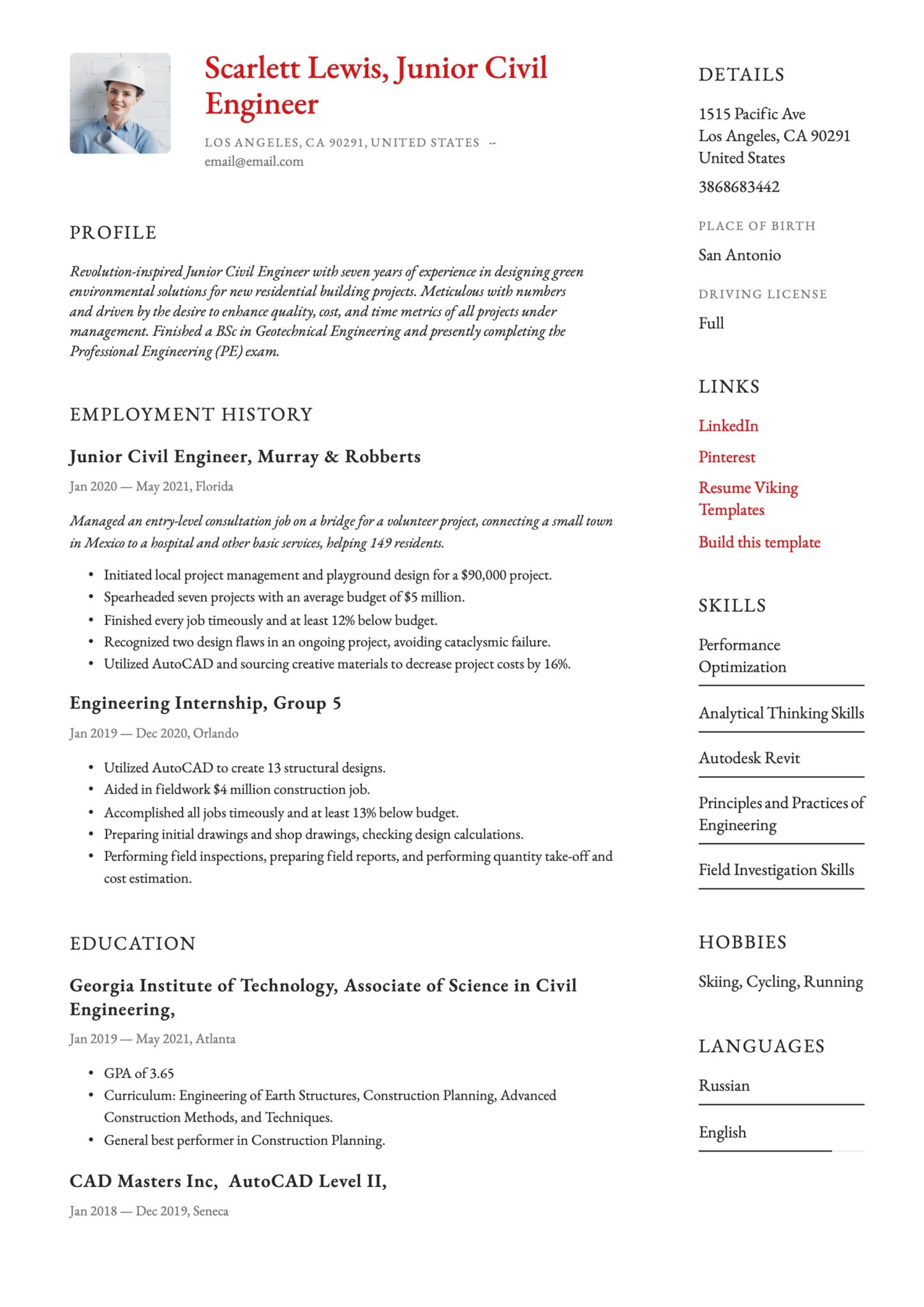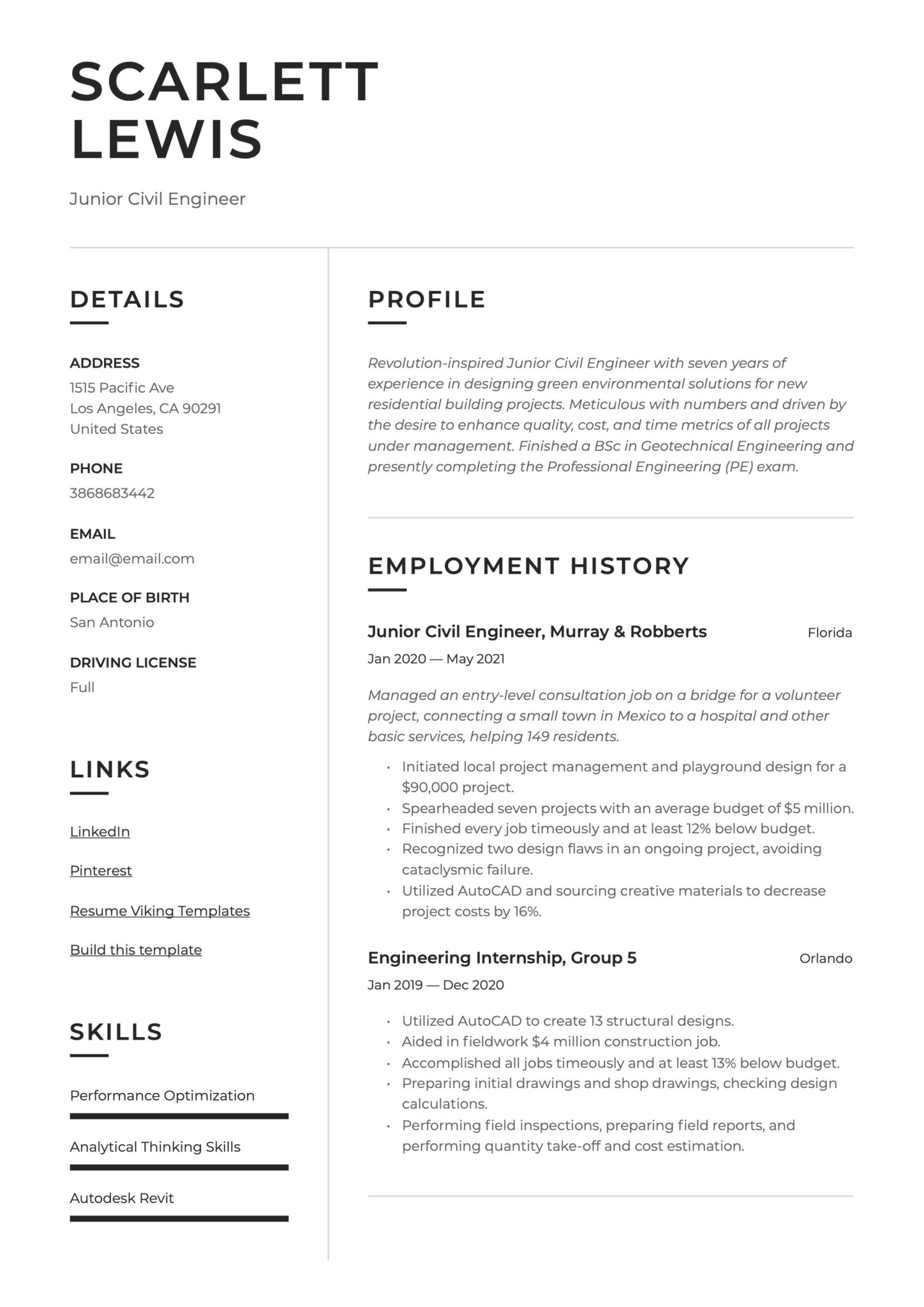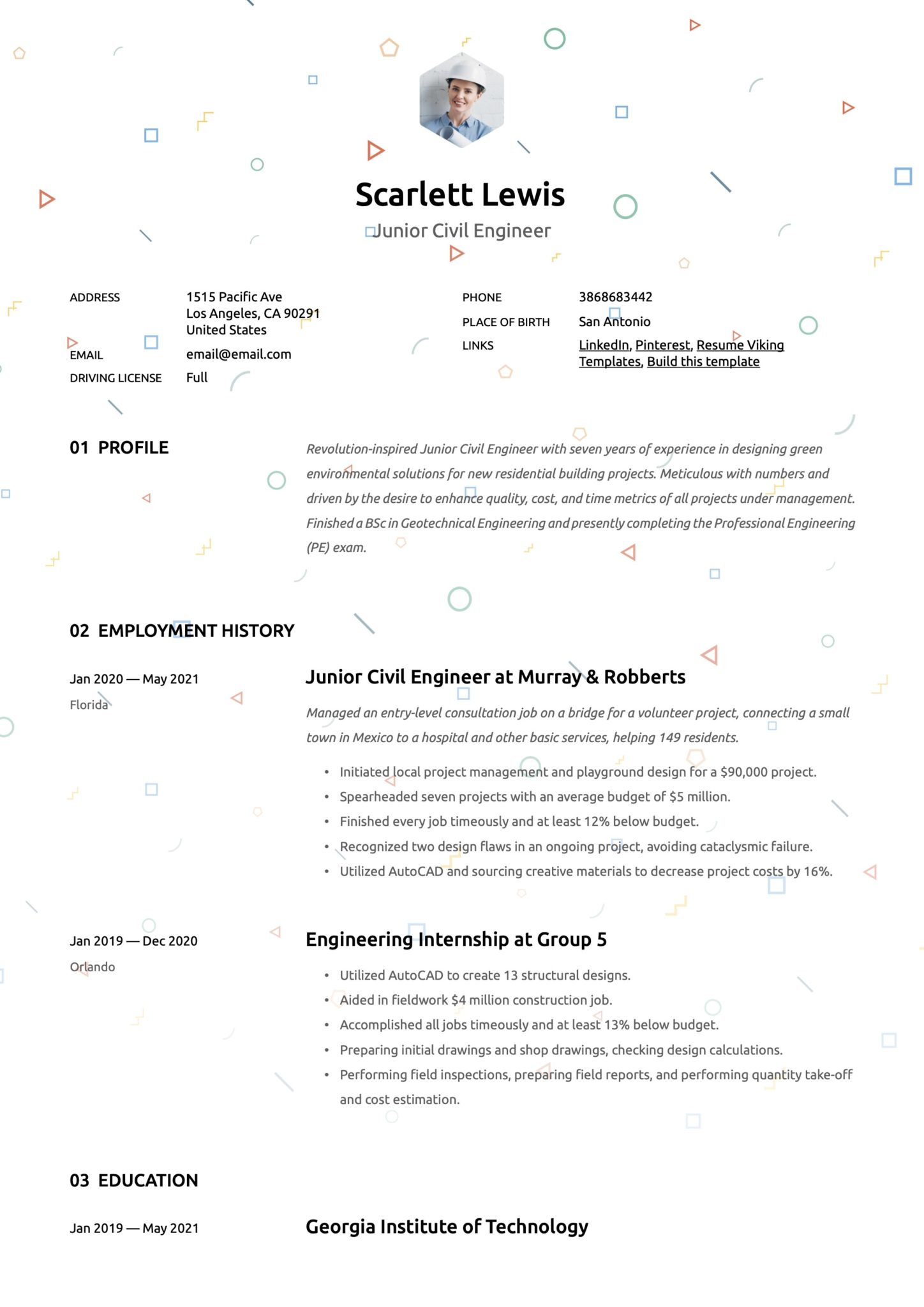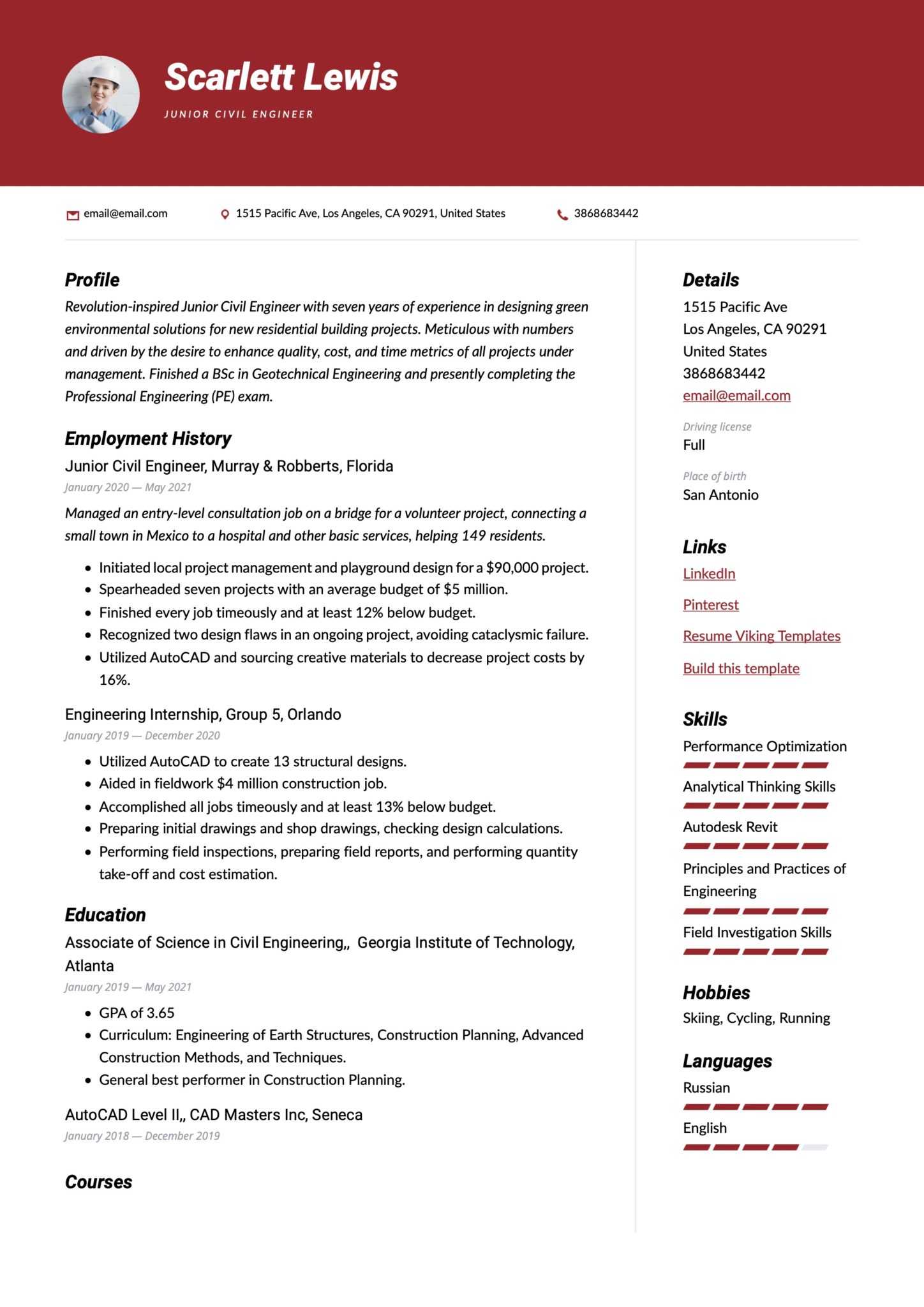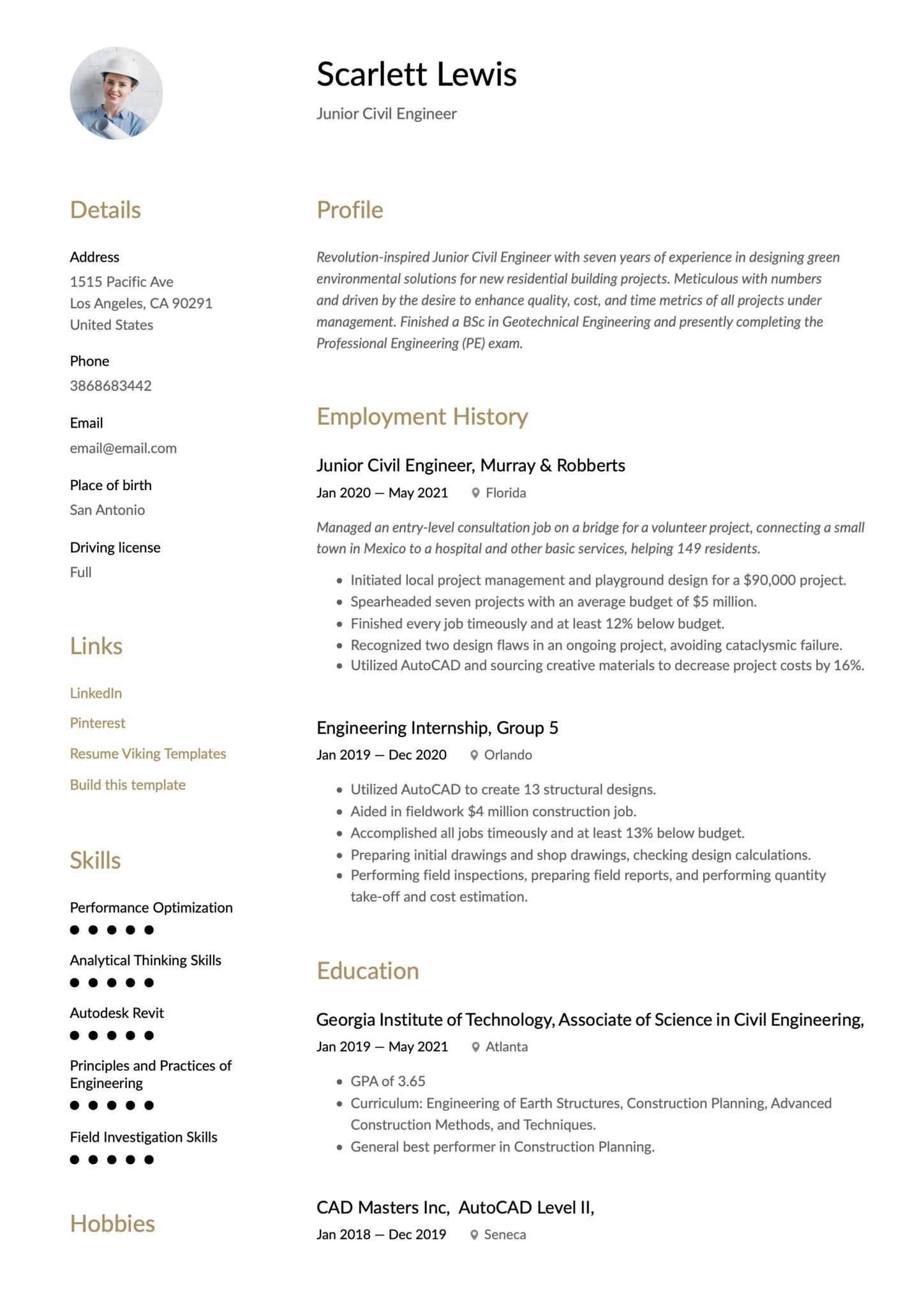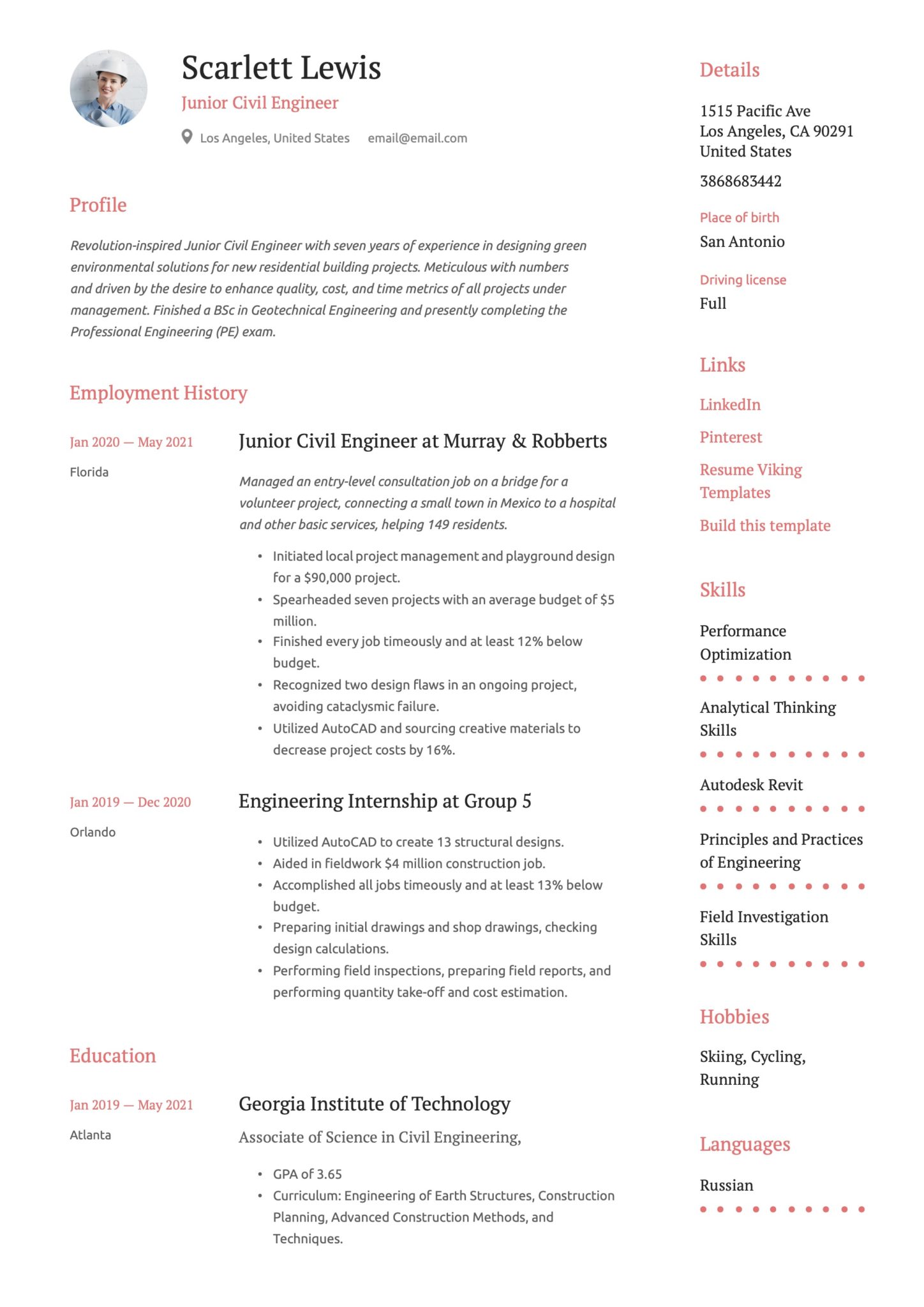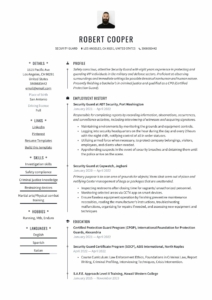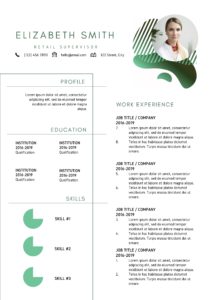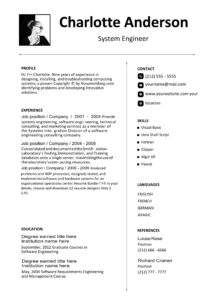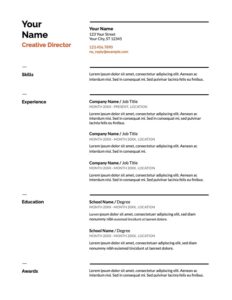Our Junior Civil Engineer resume sample is jam-packed full of tips, info, and examples to give you the edge over your competition when applying for your first/ new job. So let’s get stuck in!
What you can read in this article
Junior Civil Engineer Resume Examples
(Free sample downloads are at the bottom of this page)
Junior Civil Engineer Resume Guide
Resume Sections:
- 1. Contact information
- 2. Profile Summary
- 3. Employment History
- 4. Accomplishments
- 5. Education
- 6. Skill Section
- 7. Certification & Licensing
- 8. Extras: Languages/Awards/Publications/Volunteering/hobbies
- > Professional information
What to Highlight in a Junior Civil Engineer Resume
Irrespective of which environment you’ve worked in, potential employers must be able to ascertain if you’re the right person for the job. They don’t want to guess at how proficient you are.
First up, let them know what kind of Junior Civil Engineer you are. Because Junior Civil Engineers can work on numerous intricate assignments, usually they focus on one particular discipline.
- Construction: These engineers direct construction projects, guaranteeing they’re built and scheduled within with the specifications and plans. They’re usually accountable for the design and safety of temporary structures utilized throughout construction.
- Geotechnical: These are the ones who work with foundations of buildings, bridges, and tunnels to guarantee structural safety and strength. They also create plans that offset slopes, retaining walls, and possible movement of earth-ground structures (like landslides).
- Structural: They specialize in structural design, assessing the ruggedness, durability, flexibility, and holding capability of buildings, dams, tunnels, and bridges and confirm they follow pertinent compliance standards.
- Transportation: This part of the job includes designing, planning, maintaining, and operating daily transportation systems such as roads, airports, highways, rail stations, harbors, and mass transit systems.
Ok, sweet, you’ve specified what kind of Junior Civil Engineer you are. Now explain what your typical day looks like. We’re talking about your Analysis and Assessment, Standard Design or Innovation, and Problem Solution type responsibilities.
Then you’ll want to elaborate on the scope of your projects you’ve done. Again, include facts and figures. We’re talking about the projects’ time frame, dollar value, sizing, etc. If you were part of the groundbreaking/ pioneering innovation projects (first high rise to exceed 300 meters, first high-speed train system across Africa, etc.).
This job can be quite taxing on your body. Whether you’re climbing down into deep shafts, standing on your feet for hours, or being suspended in midair, the potential employers want to see if you can endure these conditions. Provide proof that you’re not soft.
Don’t forget that Junior Civil Engineers must be tech-savvy to survive the rigors of the industry in today's age. Therefore, recruiters want to see that you’re familiar with the appropriate technologies, highlighting them in your skills section.
1. Contact information
- First Name and Last Name
- Physical Address
- LinkedIn Profile / Portfolio Link
2. Summary & Profile
This is potentially your most critical section. It’s the first thing the recruiter will look at to determine if they will read the rest of your resume, so it needs to be on point!
You want just the right amount of info to efficiently prove your value to the prospective employer but not so much that you bore them.
Since you’re a Junior Civil Engineer, a staged approach may ring true:
- Stage 1: start with a solid personal trait/ verb and your job title
- Stage 2: include years of experience using numbers
- Stage 3: core point of your job sprinkled with 2 or 3 relevant skills (or exceptional qualities)
- Stage 4: include your highest degree/ certification/ qualification achieved
- Stage 5: Read it aloud and make sure it takes 30 seconds or less
If you have 30 seconds to impress someone, you won’t rattle off a list of skills, right? Just give them the punchy details to impress them. Keep it short and sweet!
If you have more than 2- or 3-years’ experience, write the career summary as directed above.
If you’re fresh out of the box with no/ little experience, write up an objective. Then, instead of showcasing your experience, you highlight your ambitions, skills, and how you plan to be of value to the team.
Examples:
Junior Civil Engineer Summary 1
"Highly thorough Junior Civil Engineer with proven math and physics background and proven design projects experience. An AutoCAD connoisseur with 9+ years of experience in multimillion-dollar infrastructure projects. Presently completing a Ph.D. in Structural Engineering."
Junior Civil Engineer Summary 2
"Revolution-inspired Junior Civil Engineer with seven years of experience in designing green environmental solutions for new residential building projects. Meticulous with numbers and driven by the desire to enhance quality, cost, and time metrics of all projects under management. Finished a BSc in Geotechnical Engineering and presently completing the Professional Engineering (PE) exam."
Junior Civil Engineer Summary 3
"Qualified Junior Civil Engineer with solution design experience for railroad infrastructure projects. Fully proficient in Civil 3D, AutoCAD 3D, Revit, Reality Capture, and Bluebeam. Skilled in project management and scheduling software. Just attained Autodesk Certified Professional accreditation."
Junior Civil Engineer Summary 4
"Detail-oriented Junior Civil Engineer with a strong physics and math background. Looking to provide project and design management brilliance for Asher Wolff Group. Finished internship with Jones Allen Consulting, frequently using AutoCAD and working on multimillion-dollar projects. Consulted on a bridge project that helped 145+ Mexican residents to access basic services safely."
3. Employment History
Ok, picture the recruiter behind their desk with a huge pile of resumes they must skim through before the day is done. How do you make your resume stand out from the rest? By choosing the employment history bullet points, the recruiter wants to see. Please do this by checking what they want in the job advert. Take note of the duties and obligations you see. Then make sure all your bullet points prove you can deliver on them.
Believe it or not, if you don’t have much experience, many job ads overstate necessary experience.
- 1-2 years’ experience might often just mean an internship.
- Three years may just mean one year.
- Feel free to include academic accomplishments, volunteering, and any transferable skills. They may add the needed oomph.
Junior Civil Engineer at Howden Construction
January 2014- December 2016
Managed an entry-level consultation job on a bridge for a volunteer project, connecting a small town in Mexico to a hospital and other basic services, helping 149 residents.
- Initiated local project management and playground design for a $90,000 project.
- Spearheaded seven projects with an average budget of $5 million.
- Finished every job timeously and at least 12% below budget.
- Recognized two design flaws in an ongoing project, avoiding cataclysmic failure.
- Utilized AutoCAD and sourcing creative materials to decrease project costs by 16%.
Civil Engineering Internship at Murray & Roberts
2014 between March and September
- Utilized AutoCAD to create 13 structural designs.
- Aided in fieldwork $4 million construction job.
- Accomplished all jobs timeously and at least 13% below budget.
- Recognized one design flaw in a project, preventing catastrophic disaster.
- Utilized AutoCAD and sourcing creative materials to decrease project costs by 19%.
*Pro Tip: don’t stress if you still feel like you’re a little green. It’s better to be a tad underqualified than a bit overqualified. Recruiters want people who can grow into the job.
Remember not to bore the recruiters with flat language. Utilize strong action words instead.
Job Description Examples
The career progression of a Junior Civil Engineer is quantified by specific stages, which provides standardization to job titles and experience levels
A Junior Civil Engineer Stage I (0-2 Years’ Experience) job may entail:
- Meeting every environmental and quality standard by utilizing financially sound decision-making.
- Leading a brewery plant’s design for a drain water system, resulting in enhanced usage of materials, costs, and natural resources.
- Establishing practices that enhance inventory control, decreasing waste and additional costs in the acquiring of materials.
- Initiating recycling programs, including comprehensive planning on implementation, resulting in the collection of 70 used batteries every month.
- Preparing initial drawings and shop drawings, checking design calculations.
- Developing programs that allow company construction workers to attend the Annual Construction Fair in New York City to learn best industry practices and obtain full sponsorship and support from upper management.
- Performing field inspections, preparing field reports, and performing quantity take-off and cost estimation.
- Producing blueprints from the mylars.
- Negotiating rates and checking construction materials’ quality standards.
- Reviewing quotations and achieving a decrease in the cost of materials.
- Responding to concerns and questions of the public concerning construction.
- Designing and interpreting blueprints/ archetypes for constructions and housing projects.
- Acting as the assistant engineering supervisor during the renovating and remodeling of houses according to customer stipulations.
- Estimating the average cost of warehouses and houses applying the in-depth understanding of cost evaluation techniques.
- Examining steel reinforcement following specifications and drawings.
- Conducting steel reinforcement, testing concrete in compliance with material stipulations.
- Submitting proposals with an estimated cost that includes construction materials.
- Examining concrete work on site.
- Completing progress reports both daily and weekly.
- Prepare Blueprints and Specifications for smaller projects or as component projects for large scale infrastructure initiatives.
- Use CAD to design dimensional drawings for material specification sheets or project elements.
- Review plans and blueprints for any discrepancies.
- Manage project-workflow which entails visiting numerous sites together on behalf of the Civil Engineering supervisor to check on the progress of work.
- Create cost estimates and staggered budget projections.
- Inspect Construction Sites to keep track of work progress and that safety protocols are adhered to.
- Prepare various project reports and statements.
- Provide engineering support where needed.
4. Accomplishments
So, for this section, it’s tempting to copy and paste your list of key responsibilities during your last job.
The problem with this is that you’ll repeat what you just said in the job description section, and you’ll sound really average.
Your accomplishment section must be written so that the recruiter takes notice and must read it twice to make sure they didn’t imagine it all! Make it punchy to get their attention. How, you ask? Quantification. Numbers and metrics!
Quantification 101
Quantification makes a statement! It also gives the recruiter an objective measurement of your competency and is proof of your work.
Some examples to get you started:
- Directed 13 forensic investigations into unsound commercial buildings.
- Collaborated with independent adjusters to set insurance payments 19% above average.
- Recognized five major hidden design flaws with failed constructions.
Quantification changes a standard, flat sentence into a unique statement that packs a punch, advertising the benefits with measurable figures. The terms used to describe these figures are crucial to potential employers.
Let’s have a look at what the sentences above look like without quantification:
- Directed forensic investigations into unsound commercial buildings.
- Collaborated with independent adjusters to set insurance payments above average.
- Recognized major hidden design flaws with failed constructions.
5. Education Section
This section is super important, and part of that is how you portray your education. It should look like this:
- The year you graduated
- Full name of the degree
- College Name and Location
- Abbreviated state name
Don’t be afraid to add in your achievements during your studies. Some examples are shown below.
Examples of education for a Junior Civil Engineer’s Resume:
2016- Professional Engineering (PE) Exam, National Council of Examiners for Engineering and Surveying (NCEES), Walnut Creek, CA.
2019- AutoCAD Level II, CAD Masters Inc., Seneca, South Carolina.
2018- Master of Science in Junior Civil Engineering, California State University, Los Angeles, CA.
Achieved Magna Cum Laude
Majors: Soil Composition, Geotechnical Engineering, Geology
2015- Associate of Science in Junior Civil Engineering, Georgia Institute of Technology, Atlanta, GA.
GPA of 3.65
Curriculum: Engineering of Earth Structures, Construction Planning, Advanced Construction Methods, and Techniques.
General best performer in Construction Planning.
*Pro Tip: Don't put your civil engineering internship in your education section. Add it to your work experience—it counts.
6. Skills
You must show the recruiters you have the skills needed to do the job. Don’t just list all of them in bullet point form though, that’s boring. Instead, please focus on the skills mentioned in the job advert and put them into a skills matrix format, as shown below. You’ll need to make a column for three specific types of skills: your technical skills, physical abilities, and personal traits.
Integrate these skills into your summary, and your accomplishment statements to keep your tone professional through the entire resume.
| Technical Competence | IT Skills | Physical Abilities | Soft Skills |
|---|---|---|---|
| Water Resource Engineering | Cartography | Physically Fit | Time Management |
| Geotechnical Engineering | ESRI ArcView | Able to lift 150 lb | Creative Thinking Skills |
| Structural Design | ArcGIS | Hand-Eye Coordination | Safety Conscious |
| Earth Structures | Intergraph MGE | Dexterity | Meticulous |
| ETABS | Microsoft Visual | Endurance | Self-Motivated |
| Autodesk Revit | LabVIEW | 20/20 Vision | Driven |
| STAAD Pro | Verilog | Power | Accountable |
| Physics | Microsoft Project | Wear Protective Gear | Project Management |
| Mathematics | Oracle | High-Rise Construction | Focused |
| Primavera Enterprise Project | Nimble | Problem Solving |
7. Qualifications & Certifications associated with Junior Civil Engineers
| Master’s Degree in Junior Civil Engineering | Fundamentals of Engineering Exam (FE) | Bachelor of Junior Civil Engineering (Various Disciplines) |
| Construction Technician Certificate | Professional Engineering Exam (PE) | Advanced Safety and Health Certificate |
| LEED Green Associate | Professional Matlab Certificate | Project Management Professional (PMP) |
| Advanced Diploma in Graphic Imaging | Special Hazards Systems Exam | Junior Civil Engineer Apprenticeship |
Action Verbs for your Junior Civil Engineer Resume
| Controlling | Problem Solving | Monitoring |
| Remodeling | Scheduling | Detecting |
| Fabricating | Deductive Reasoning | Finishing |
| Analyzing | Calculating | Operating |
| Constructing | Installing | Prioritizing |
| Assessing | Recommending | Diagnosing |
| Interpreting | Testing | Measuring |
| Balancing | Setting | Identifying |
| Experimenting | Evaluating | Discovering |
Optional Extras for Junior Civil Engineer Resumes
Unfortunately, people, recruiters won’t hire you solely based on your experience and education. With all the competition around, you must add an “others” section to help set you apart from the competition.
Certificates
PMI, PMP
USGBP, LEED AP
Conferences
2013 ASCE Week, spoke on a panel regarding green design
2015 ASCE Forum
Publications
2019 Article on AutoCAD published in ASCE Magazine
2011 Article on project management mentioned by Business Insider
Additional Activities
Active ASCE member
Leader of the local running club. Increased membership by 40%
Professional Information on Junior Civil Engineers
Sectors: Engineering, Construction, Building, Infrastructure Engineering, Infrastructure, Transportation, Water & Sewage, Environmental
Career Type: Engineering, Planning, Design & Programming, Evaluating, Evaluation & Assessment, Building & Construction, Project Implementation & Execution, Product Development, Research
Person type: Leader, Designer, Planner, Executor, Implementer, Analyzer, Inspector
Education levels: Bachelor Degrees to Doctorate Degrees
Salary Indication: An Average of $ 64 458 per annum (Zippia)
Labor market: Expected 2% growth from 2019 – 2029 (BLS)
Organizations: Various
Download Junior Civil Engineer Templates
